#then you know how keen I am about well shown resemblence between human and animal face expression
Text
Look at these cats and their human versions series by Gerrard Gethings (gezgethings on Instagram):

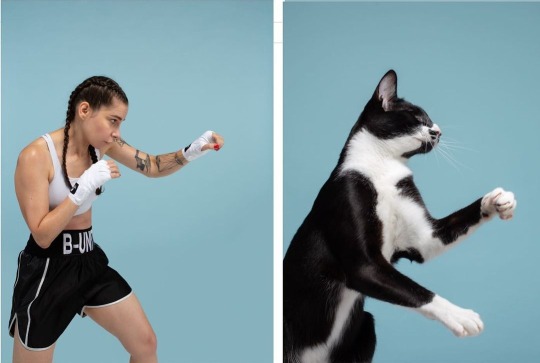

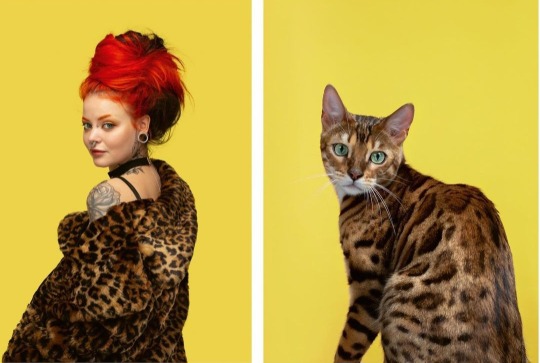








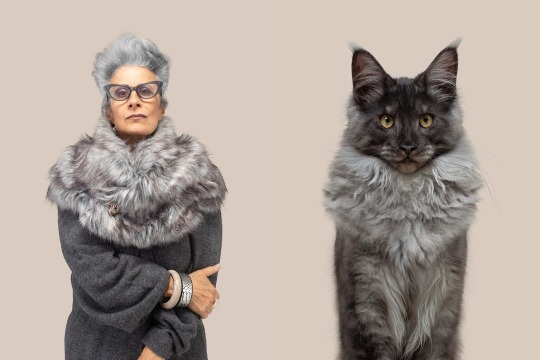





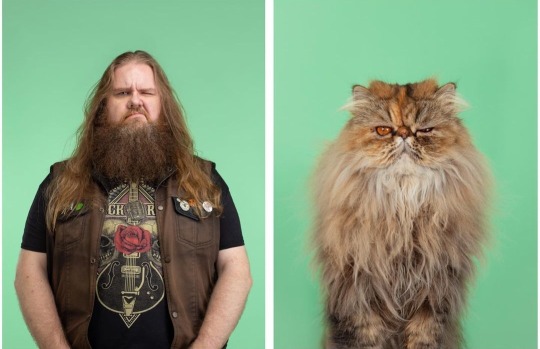
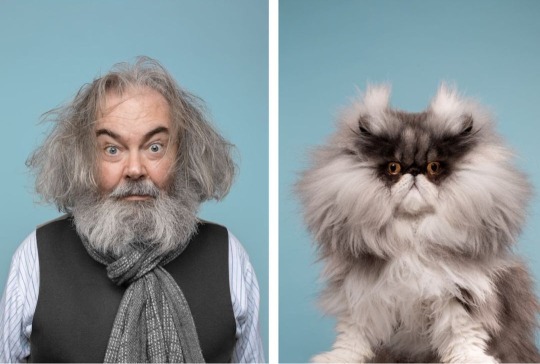


#if you know my art (my ''zoomorphic fanart'' especially)#then you know how keen I am about well shown resemblence between human and animal face expression#and the series of cats and dogs and their human versions by Gerrard Gethings are my most favorite!🥰#cats#anthropomorphic#zoomorphic#anthropomorphization#zoomorphization#cat face#instagram#seek similarities brain mode
750 notes
·
View notes
Text
Me vs. The Mitchells vs. The Machines
The Mitchells vs. The Machines is a really cool movie. Seriously! It’s the Spider-Verse crew continuing to be at the top of their game, doing their damnedest to elevate and evolve 3D film animation in a way apart from the ongoing Disneyfied edge-sanding seen elsewhere. Several sequences, especially the final fight scene at the end, are absolutely jaw-dropping. A lot of the writing of the movie is also genuinely clever, with some cool tricks of weaving in Chekov’s Guns that you don’t even realize WERE Chekov’s Guns until they’re deployed, but then make perfect sense. And I also just have to say there’s something oddly heartening about a movie that does a lot to target Millenials in terms of nostalgia, but not so much via our shows and movies and music the way other project might go about, but specifically by tapping the internet meme culture of the early-00’s that’s so media-unique to that emergent generation. There’s some genuine heart visible in so many of the levels of how this thing was made that I can understand its touting as an instant classic and the waves of praise and popularity that have followed its release.
Unfortunately, I can’t so unilaterally praise this movie, mostly because I can NOT stop thinking about how poorly-implemented and mis-framed its central familial conflict is.
Oh yeah spoilers for this movie I guess
So I’ll need to detour at first and talk about A Goofy Movie, which isn’t much of an issue for me since I fucking love A Goofy Movie. And watching The Mitchells vs. The Machines my initial takeaway was a pleasant observation that someone had basically grafted A Goofy Movie to The World’s End, which could have made for an extremely fun time for me. A Goofy Movie, so it goes, centers on the conflict between a father and child trying to understand each other, spurred on by the father conscripting the child into an impromptu road-trip which the child initially resents but eventually leans into as a vehicle for understanding as the family members open up to each other and end with a greater appreciation for their familial bond as well as healthier, more open lines of communication. There are comical misunderstandings, dramatic misunderstandings, and escalating Wacky Adventures that keep the trip feeling suitably cinematic in scope. And as The Mitchells vs. The Machines continued on, I kept finding myself rounding back to that comparison and asking “Why am I not getting into this as much as I do A Goofy Movie?”
It turns out to be a point of motivation, actually. In A Goofy Movie, Goofy dragooning Max into the cross-country fishing trip is immediately borne out of his (however misinformed) desire to keep his son from going down a wrong, potentially delinquent or criminal path. Goofy has concerns about the lessened connection and communication with Max, sure, but that’s a symptom of his inability to communicate his actual worries about Max’s behavior to him, not the sum total of the problem he feels needs fixing. Goofy is under the impression there are genuine problems Max is going through, and while he’s got the actual particulars wrong, he’s not really that far off, since Max still IS the kind of kid to elaborately hijack a school function or make up extravagant lies to get attention from the girl he likes rather than just talking to her and asking her out like a normal human-dog-person. Goofy’s objective is firmly centered on helping Max for Max’s sake, and he’s only taking up a few weeks out of Max’s summer and causing him to miss a single party in order to do it.
I lay all that out so you can try to understand my headspace coming at critiquing The Mitchells vs. The Machines and negatively viewing its own take on a plot concept I ostensibly love by default. The problem, as said, is one of motivation. In The Mitchells, Rick’s dissatisfaction with his relationship with his daughter Katie is purely that: Dissatisfaction with their relationship. Katie herself is, by all accounts, doing spectacularly. She’s got a healthy relationship with friends and other family members, she’s gotten accepted into a prestigious film school, and her YouTube account seems to pull pretty keen numbers (With all the tech jokes in this movie it’s a wonder there’s never a riff on her shilling NordVPN or Raid Shadow Legends). The conflict between father and daughter is purely a case of them growing apart in her teen years demonstrably because Rick has no understanding of her current passions and makes no effort to do so, which leads to him having consistently questioned and doubted her ability to succeed in her field. The film frames the impromptu road-trip as his attempt to ‘fix’ the issues between them, but the only thing broken by the presentation of the story is Rick’s approach to parenting in the first place. He could easily have made Katie warm to him on the way out by replacing or paying for the laptop he broke and throwing her a subscription to her YouTube channel, but then the movie would be shorter and we wouldn’t be able to pretend the conflict was anything other than his own pursuit of self-centered actualization.
That’s the other issue, of course, the way The Mitchells vs. The Machines consistently rounds back to the point that Katie is somehow shouldering half the responsibility for the father/daughter communication breakdown. But as stated above, it really has hardly anything to do with her. Katie’s succeeding on her own terms, and the only outreach she would theoretically need to do to her dad would be to make HIM feel better, something he could do himself if he’d only actually pay attention to the cool videos she keeps trying to show him and not constantly deciding that HE knows that SHE will fail. It’s a fundamentally one-sided conflict from what we’re shown, and yet the other members of the Mitchell family continuously treat Katie like she needs to accommodate her father’s personal whims and not hurt his feelings despite the fact that he’s the one who went behind her back and canceled her flight, even forcing her to miss her first week of college (!) simply because he felt sorry for himself that they didn’t like the same things anymore. Again, Katie’s doing great, it’s Rick that decides to make his problem the entire family’s problem, and while I’m going to hesitate to refer to this behavior as out-and-out abusive, it is still absurdly selfish and pointedly poor parenting.
The movie seems to nominally strive for balance in the conflict, not making it entirely Katie’s job to fix her dad’s hurt feelings, and indeed having a whole sequence where he realizes what a Big Jerk he’s been about not trying to understand or support her passions, and resolving to actually Make An Effort moving forward. The problem is that this is still framed as one half of the equation, as Katie supposedly gets to understand where her dad is coming from, which...makes her feel better about all the times he said she would fail and so she should rely on and appreciate him more? And the reason that’s a fundamental issue is annoying, because it means we have to talk about Rick’s Stupid Fucking Cabin.
Look, I hate doing this. I personally try very hard to keep in the mindset that stories are stories and things happen in them because they are stories. I am loathe to attempt picking apart the points of particular plot points, but the problem is that this Stupid Fucking Cabin is positioned as the heart of the humanity of the entire movie, yet it hinges on a sequence of decisions that no actual human being would ever come by. First off, do you have any idea how long it takes to BUILD a home like that, let alone as one guy apparently doing it himself? Rick spent the better part of his twenties building this big Fucking Stupid Cabin to fulfill his lifelong dream of ‘Living in the woods’, only for his wife to get pregnant once it was finished, leading to him just dropping like that? Was there no planning in this family? Was Katie an accident that Rick immediately was this endeared to? I mean, he totally seems like a pro-lifer. But then why do they need to sell the Stupid Fucking Cabin on account of a kid coming along? How were Rick and Linda planning on living out their lives there if not with resources that could support them as well as a kid or two? Rick could have just raised his kids in the woods in his Stupid Fucking Cabin and they would have stood a better chance at turning out like little duplicates of himself and his own interests like he clearly wanted. That’s to say nothing of this sequence of events being framed as a ‘failure’, despite that fact that Rick handily succeeded at what he set out to do, only to turn around and abandon the thing he succeeded at himself on seemingly the same sort of impulsive whim that leads to him dragging his whole family on a road trip because he doesn’t understand YouTube. There are motivating factors to these decisions he made that could inform the whole context of this supposedly tragic backstory, but we aren’t privy to anything resembling them, and the result is a plot point that seemingly only exists to make Katie (and the audience) feel bad for Rick in the third act of the movie.
The real answer is the ultimate assertion of this thing by the finale, that Katie should be ‘grateful’ to Rick for his ‘sacrifice’ of his dream that supposedly allowed her to be in the place she is now. Except Katie had no part in Rick’s bizarre impulsive choice to build a Stupid Fucking Cabin then sell it as soon as a kid popped out so he, I guess, could feel some sense of important familial contribution. That’s to say nothing of the point about parental figures who make grand, sweeping gestures nominally for the good of their kids, but are effectively and emotionally unavailable in the day-to-day engagements of their lives. Because unlike Goofy in A Goofy Movie, Rick isn’t actually doing what he’s doing for Katie’s sake. Her motivation for most of the movie is to move away from home and go to college, a completely normal-ass thing that children do. Any of Rick’s outreach or efforts to ‘fix’ relationships and situations are purely for the sake of his own hurt feelings, and the way Katie’s mother and brother consistently push her into going along with them only highlights the overt way this whole family’s problems are hung up on the insecurities of of this single stubborn jerk. But then, that’s my other major misgiving with The Mitchells vs. The Machines: Its expected exaltation of the default biological family as some hallowed unit for which it is a tragedy to fall into any degree of dysfunction. This is with pointed dismissal towards the idea of Found Family, seen as a distraction, an obstacle to Katie realizing who her TRUE people are, and coming around to a sense of fulfillment because she managed to massage her dad’s ego for long enough that he stopped being totally dismissive of the things that brought her joy. You see, Found Families are fun, but they aren’t REAL or SPECIAL because they already accept and appreciate you for who you are, unlike these people you’re biologically obligated to share living space with for 18+ years whom you have to forge bonds with through varying degrees of communication breakdowns and compromises in self-agency.
With all that in mind, it highlights some of the smaller issues in the movie’s setup as well. This is perhaps petty, but jeez was I annoyed with the film’s framing of The Mitchells as this ~craaaazy~ ~weeeeiiiird~ family which included such outlandish quirks as ‘Dad who doesn’t understand technology’ and ‘Young boy who really likes dinosaurs’. And the wishy-washy tone of the familial conflict is echoed in the ‘The Machines’ part of the plot, which mostly led to me sitting on edge throughout the whole film as I wondered how it was going to come down on the subject of those kids and their darn smartphones. It ultimately doesn’t go full anti-technology, which makes sense given how much of Katie’s character revolves around using the stuff, to say nothing of the predilections of the people who actually, uh, made this movie. But the most it can manage is a halfhearted “Maybe unregulated big tech bad?” which even then is undercut, mostly I assume because of the various big tech companies involved in producing and streaming this thing. Don’t get me wrong, I’m overall glad it doesn’t go full "durr hburr technology is bad fire is scary and thomas edison was a witch", but a lack of any insight or ideas on that front means that the familial relationship element is the only conceptual element it really has to stand on, and I just spent over 1800 words breaking down why that fundamentally didn’t work!
It’s an aggravating situation, because lord did I want to love The Mitchells vs. The Machines. It’s gorgeous, it’s got some clever bits in the writing, and it can honestly sling a punchline like nobody’s business, there are some KILLER jokes in there. But it just became impossible all the way through the end for me to engage with the heart of the movie, its central connective conflict, on the terms it wanted me to. Now it’s admittedly possible that, perhaps like Rick Mitchell, that’s my problem. I’ve seen a lot of love for this movie from my peers, and it does make me question my own projections: I don’t want to get TOO personal on main, but I admit that it’s entirely possible that people who’ve enjoyed an actually functional fatherly relationship would better engage with the emotive connections this movie wants you to make. But even with that caveat, I was able to find my own way to resonate with the similar stakes of A Goofy Movie just thanks to the more effective way that one was framed, so if this one couldn’t hook me, maybe it was The Mitchells vs. The Machines’ fault after all.
9 notes
·
View notes
Text
Netflix Death Note: My Thoughts
So the long awaited American adaptation of Death Note arrived on Netflix on Friday the 25th of August, and it’s clear to see that the reviews are certainly mixed.

Let’s just jump right in and get down to the many faults with this adaptation.
Note* This isn’t all doom and gloom, as I think there is definitely some room for appraisal. There will be many spoilers ahead but who cares, right?
Light Turner (Light Yagami):
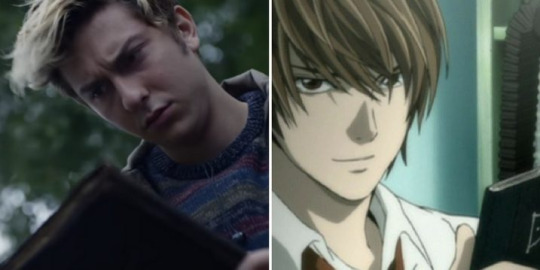
Light is essentially a bit of a loser, taking crap from bullies and even from L. As we know from the anime, Light isn’t hesitant on throwing in a good ol’ punch to the face. Yet in this adaptation, Light seems to just accept any grief that he is presented with. In addition to this, Light appears to be a bit of a loner, as we never see him socialising with any friends. Now in the anime, whilst it wasn’t common for Light to have the boys around for a few games of Mario Kart, he was still acknowledged around school to “hang out” with other students, but he of course declined because he’s a busy bee with a rotten world to cleanse
Another point to mention regarding Netflix Light is how careless he is. At many moments throughout the movie, Light can be seen shouting about the Death Note whilst in loud conversation with Mia (Misa Amane) and he even has his Death Note out on his lap during gym class. Whereas we all know that anime Light would never do something like that. He understood the importance of keeping the Death Note hidden from absolutely everyone, and wouldn’t dare openly talk about it in public. Because why would he be so careless? He wouldn’t. This links in to Lights intelligence, or so to say, craftiness.
Netflix Light doesn’t appear to be the brains of the operation, except at a few key points towards the end of the movie. throughout the anime, Light had his head screwed on from the start, and he allowed absolutely nothing to get in his way. He also wouldn’t sacrifice the Death Note for anyone or anything (except when Sayu, but of course he had a plan to wind up getting the Death Note back) In the Netflix adaptation, it is more Mia who has true intentions for the Death Note, and it appears that Light doesn’t really have everything set in stone, as he did in the anime. I’ll elaborate more on that when I discuss Mia’s character.
A crucial key aspect to mention is that at no point did Light proclaim “I am the God of the new world”, which is severely disappointing,as anime Light genuinely believed that he was Justice, but Netflix Light just wants to be a do-gooder and be rid of the bad guys. Netflix Light also never has a psychotic moment of ranting to Ryuk, himself, or anyone for that matter. Anime Light is iconic for having random outbursts of craziness, as all great characters do, but Netflix Light is pretty chill throughout the movie, with the exception of the moments in which he thought he was about to get caught out. I just believe that it would’ve been more enjoyable for Netflix Light to have been portrayed as the Evil Genius that we know him as.
Now onto Mia Sutton (Misa Amane):
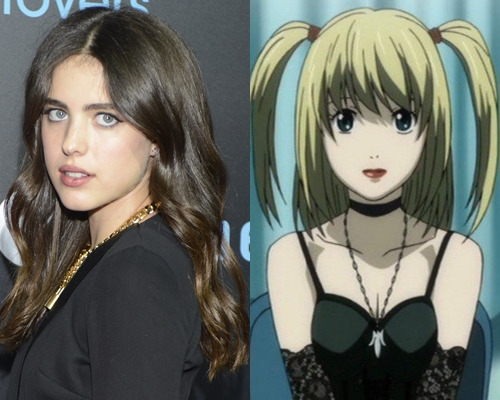
In complete contrast to Anime Misa, a cute blonde model with a slight sinister streak, Mia Sutton is a dark haired edgy cheerleader who smokes (see? bad habits = bad movie) In a weird way, from watching Mia, I got the feeling that she was more suited to be Light Yagami than what Netflix Light was. Let me explain: At the beginning of the movie, Mia is the typical semi-popular good looking cheerleader. However, the look on her face is like a constant expression of boredom, similar to anime Light at the beginning. When Mia discovers the power of Lights Death Note, she is the one who is more keen on changing the world, as though it was her all along who has been “bored” of how things have been working out in the legal system, and as though she is the one with the real desire to be rid of all criminals in the world. This includes the lives of innocents who stand in her way.
The key difference between Mia and Misa is that Mia’s drive to use the Death Note is for her own personal desire, and she is very willing to throw Light under the bus, as revealed when she wrote his name in the notebook and promised to burn it so long as he gave her ownership of it. Whereas Misa on the other hand done everything under Lights instruction, and wouldn’t dare step out of line. This can be said to be because Misa was infatuated with Light, therefore her use of the Death Note was to assist him. If anything, Mia is more problematic to Light, despite being clever, that what Misa was.
This adaptation really spun things around for Misa’s character, as it conveyed Mia as intelligent, and only looking out for herself. I suppose this is only considered a fault if you prefer the original Misa.
Furthermore, the relationship between Light and Mia is also in stark contrast to Light and Misa. Netflix Light appears to be genuinely in love with Mia, and it actually seems that he is more interested in her than what she is with him, as we can assume she is only in it for the Death Note. Anime Light has zero romantic attraction to Misa, and only kept her safe as he was under threat from Rem. If it wasn’t for that, Light would’ve disposed of Misa in a heartbeat in order to make matters less problematic for himself. And yes, whilst we can say “but Netflix Light wrote Mia’s name in the Death Note” I don’t believe that was his intention from the start. I think he genuinely loved Mia, but upon realising that she was going behind his back and eventually holding his life against him, he had to fight back.
Another cringe detail on Mia and Lights relationship is how edgy and quirky they are. Their relationship is portrayed as slightly darker than anime Light and Misa. For example, they “make out” whilst writing names in the notebook. Honestly, how twisted does one have to be to get in the mood whilst killing people? In addition to their edge & quirk, Netflix Light has a “normal people scare me” picture in his locker, next to a picture of the two of them, Light and Mia. C'mon guys, only the edgiest of teens own American Horror Story merchandise. Having said that, I do see a slight resemblance between Netflix Light and Mia to Evan Peters and Emma Roberts… Oh, not to mention their edgy homecoming pictures. Choking? Very edgy indeed.
Now onto L:
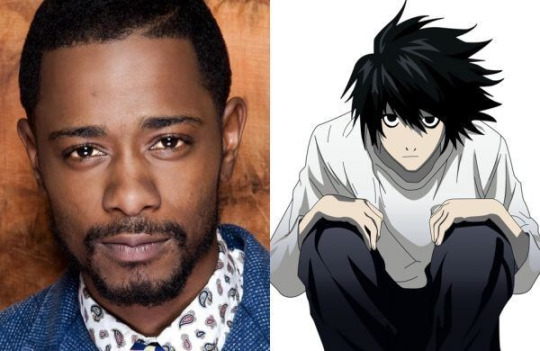
Whilst my thoughts on L may be bias, as he is my favourite character in the anime and the movie, I am able to acknowledge his faults. Let’s start with his irrationality. For the beginning of the movie, Netflix L appeared to walk in similar footsteps to that of anime L, with some minor changes such as the way in which he addressed Kira during a press release, and confronted Light in a cafe of sorts. However, the calm and collected demeanour suddenly shifts after Watari’s disappearance, when L begins to panic. Instead of taking a rational approach, as anime L would, Netflix L decides to let his emotions get the better of him, and carries out a series of irrational behaviours: starting with almost assaulting Light at his house, before being stopped by a poorly portrayed Soichiro Yagami (but more on that later), then onto stealing a police car and, whilst being armed with a gun, recklessly chases after Light, and then attempts to shoot him. As we have witnessed in the anime, L isn’t keen on moving around much, so this adaptation was probably a bit too quick and fast to suit anime L. Another mistake Netflix L makes is announcing to a bystander that he is a detective and Light is Kira, and that’s why he’s pointing a gun at him. Of course, L is ultimately struck down by this bystander, allowing Light to escape. What was disappointing about this was that anime L would’ve known that virtually anyone could be a Kira supporter, and would’ve done anything to protect who they thought was Kira, so the real rational minded L wouldn’t have made that announcement. To be fair, the real rational minded L wouldn’t have been having a physical showdown with Kira in the back alley of a restaurant in the first place.
My final kick at Netflix L is that he’s a bit of a crybaby, very much unlike anime L. Throughout the movie, Netflix L is shown to be very passionate about justice and all that business, but he seems a little /too/ passionate. He is even seen to be crying at the end of the movie, which we know is very uncommon for the original L. This can be perceived to make L look weak, and sort of as though he’s lost the “war”.
In conclusion to Netflix L, this adaptation managed to maintain his quirks and mannerisms, however I do believe that he was made to be more emotional, which I guess is a good thing as we get to see that he is a real human.
Ok so here’s a lil list of various other flaws that aren’t necessarily worth making a big rant about:
•Watari’s name is Watari, and not an alias. This made it easy for Light (well technically Mia) to kill him.
•Wammy’s house has a different name, and it’s also dead. The orphanage has been abandoned and it just looks sad.
•The guy who played the guy who’s supposed to be Soichiro Yagami (cba learning the names) was not the best at all. His performance was so dry and pretty much annoying. The real daddy yagami wouldn’t stand for this.
•There is no Mello, Near, Matt, or any of the task force.
•Lights mum is dead and there isn’t a little sister who can’t do quadratic equations.
•Everything seems to move a bit too fast in the film, so I think that if you weren’t familiar with Death Note, then you’d probably be confused as to what’s happening.
•Ryuk isn’t that thing in the corner that laughs maniacally and makes the odd quip. Instead, he’s quite keen on making Light give up the Death Note, as he can see the trouble it’s causing. Anime Ryuk is preferable as he thrived off the chaos, which made his character more appealing.
There are most likely many more but I feel like I’ve dug deep enough.
I have to admit, the soundtrack for the Netflix adaptation was actually really good
#deathnote#death note#netflix#live action#remake#american#thoughts#nat wolff#lakeith stanfield#margaret qualley#willem dafoe#2017#2006#light yagami#l lawliet#misa amane#ryuk
307 notes
·
View notes